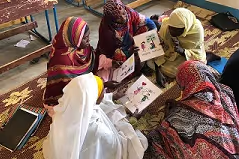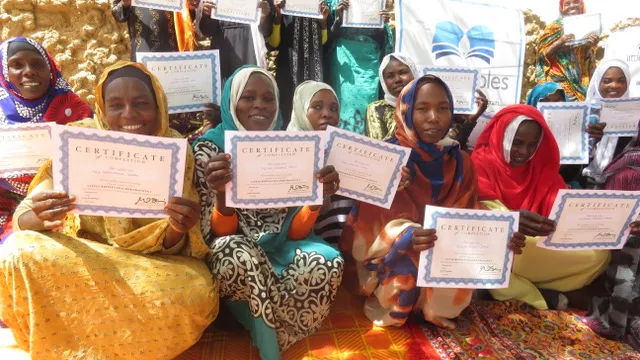Learning from each other

Blog written by Sara-Christine Dallain.
As I looked around the room at the women sitting in a large circle, I saw blank facial expressions and averted eyes. It turns out, as we would later learn, the women were expecting us to stand up next to the blackboard and begin “training” them.
We did not do that.
Instead, we joined their circle and asked them to stand and lead us in a song. We then asked each woman to introduce herself and tell us her favourite type of food (this resulted in a lot of giggles). Introductions were followed by a mindfulness exercise, and then the group spent the rest of the training day learning evidenced-based practices for early childhood development and education by doing, playing, practicing, and questioning. Each activity we completed was a first for the majority, if not all, of the women.
The initial feedback we usually receive from every woman who participates in a Little Ripples Teacher Training session is that it looks different, and, specifically, that the training occurs in a circle and participants actually participate.
That’s because the Little Ripples training is structured to model the exact same type of environment, behaviour and learning that we expect teachers to carry out in their Little Ripples Ponds. A space in which children feel safe to be children and to express themselves, in which children have fun and build their imagination, and in which learning happens by doing and playing.
Saida, a 32-year-old woman living in refugee camp Kounoungou and who participated in the training remarked:
This training is a different style of learning. We sit in a circle and we share information with each other and by way of this, we are learning so much.”- Saida, 32.
In refugee camps Mile and Kounoungou, eastern Chad, a total of 50 refugee women have completed Little Ripples Teacher Training and an initial 16 have been selected and employed to serve as the programme camp coordinators, education directors, and teachers.
Little Ripples is officially beginning in camps Mile and Kounoungou, and in the coming weeks, we’ll be sharing more about each new Little Ripples in-home centre, teacher and programme activities.

Feature photo caption: Women work in groups to create fun ways to teach the programme pillars of peace, helping and sharing. Credit: iACT.

Stay updated
Sign up for our newsletter to receive regular updates on resources, news, and insights like this. Don’t miss out on important information that can help you stay informed and engaged.
Explore Elrha
Learn more about our mission, the organisations we support, and the resources we provide to drive research and innovation in humanitarian response.


.png)